October 1912
| << | October 1912 | >> | ||||
|---|---|---|---|---|---|---|
| Su | Mo | Tu | We | Th | Fr | Sa |
| 1 | 2 | 3 | 4 | 5 | ||
| 6 | 7 | 8 | 9 | 10 | 11 | 12 |
| 13 | 14 | 15 | 16 | 17 | 18 | 19 |
| 20 | 21 | 22 | 23 | 24 | 25 | 26 |
| 27 | 28 | 29 | 30 | 31 | ||
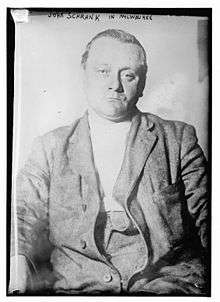
October 14, 1912: John Schrank shoots Theodore Roosevelt at Milwaukee
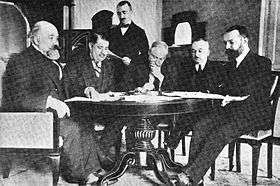
October 18, 1912: Turkey's war with Italy ended by treaty
Roosevelt
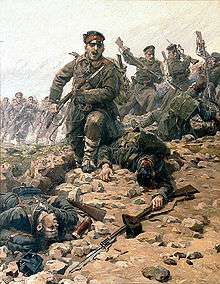
October 17, 1912: Turkey's war with Balkan League begins
The following events occurred in October 1912:
October 1, 1912 (Tuesday)
- Turkey and Greece both mobilized their armies in preparation of war.[1][2]
- The capital of British India was formally moved to Delhi from Calcutta.[3]
- Born: Kathleen Ollerenshaw, British mathematician, known for research in order theory and abstract algebra, in Withington, England (d. 2014)
October 2, 1912 (Wednesday)
- Bulgarian troops seized control of Turkish blockhouses at Djuma-i-Bala district.[1]
- Serbia, Montenegro, Greece and Bulgaria delivered an ultimatum to the Ottoman Empire over North Macedonia.[4]
October 3, 1912 (Thursday)
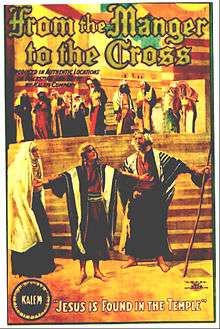
The hit motion picture of 1912
- From the Manger to the Cross, the silent film about Jesus, by Sidney Olcott, premiered in London, followed on October 10 by its New York City release.[5] and was the first to be filmed on location in the Holy Land.[6]
- General Smedley Butler and Colonel Joseph Henry Pendleton of the United States Marine Corps had given Nicaraguan rebel general Benjamín Zeledón an ultimatum to surrender the El Coyotepe fortress by 8:00 am or face bombardment by American artillery and then an invasion. The rebels refused to capitulate, and American shelling began minutes later.[7]
- Turkish frontier guards attacked troops of Montenegro at Berane.[1]
- The longest drought in U.S. history began in Bagdad in San Bernardino County, California. For the next 767 days, more than two years, no rain fell on the town in the Mojave Desert.[8]
- Crowds in Constantinople demonstrated in favor of Turkey going to war with Bulgaria.[1]
October 4, 1912 (Friday)
- Off the coast of Dover, the collision of the submarine B2 with the Hamburg America Line ship Amerika killed 15 sailors. B2 was part of a flotilla of 13 submarines patrolling four miles from Dover as part of Royal Navy maneuvers, and crossed 60 feet in front of the bow of Amerika, which was moving twice as fast and was unable to stop. Only one man, Lt. Richard I. Pulleyne, survived, swimming upward after the sub broke in two.[9]
- The U.S. Marines attacked Nicaragua's rebels before dawn, advanced uphill and captured the fortress on El Coyotepe despite being fired on by the remaining rebels. Four Americans and 27 rebels were killed, and another 14 U.S. infantrymen wounded.[7][10]
- The first University of Calgary began classes, with a faculty of three professors. The Alberta provincial legislature would not give the University power to confer degrees, and the University of Alberta did not welcome the competition. As result, the university would close its doors in October 1915.[11]
October 5, 1912 (Saturday)
- French Prime Minister Raymond Poincaré addressed the British Foreign Office regarding averting war in the Balkans, with the assistance of Austria-Hungary and Russia.[1]
- The parliaments of Bulgaria and Serbia met in extraordinary session to discuss going to war.[1]
- Jack Zelig, a witness for the prosecution in the trial of New York City Police Department lieutenant Charles Becker was shot and killed in New York City while preparing to board a trolley, two days before the trial was to start.[1][12]
- Carl Stearns Clancy, 22, began his quest to become the first person to take a motorcycle around the world, setting sail from Philadelphia to Dublin. He would complete the job on August 27, 1913, after 18,000 miles.[13]
- The New York Highlanders played their final baseball game, ending a seven-game losing streak to defeat the Washington Senators 8-6, and finishing in last place in the American League with 50 wins and 102 losses. In 1913, the team would have a new manager, mostly new players, and a new name, as the New York Yankees.
- Born:
- Karl Hass, German SS officer, perpetrator of the Ardeatine massacre, in Kiel, Germany (d. 2004)
- Kristina Söderbaum, Swedish-German actress, known for her roles in Nazi era films, in Stockholm (d. 2001)
October 6, 1912 (Sunday)
- American troops captured the city of León, Nicaragua.[1]
- Died:
- Auguste Beernaert, 83, Belgian state leader, 14th Prime Minister of Belgium (b. 1829)
- William A. Peffer, 81, American politician, U.S. Senator for Kansas from 1891 to 1897, first senator to be elected from the Populist Party (b. 1831)
- Susie Taylor, 64, American medical officer, first African-American army nurse (b. 1848)
- Walter William Skeat, 76, English linguist, author of The English Dialect Dictionary (b. 1835)
October 7, 1912 (Monday)
- A proposed peace agreement to end the Italo-Turkish War was presented by Prime Minister Giovanni Giolitti to the Italian cabinet.[1]
- Born: Fernando Belaúnde Terry, Peruvian state leader, 57th and 60th President of Peru, in Lima (d. 2002)
October 8, 1912 (Tuesday)
- The First Balkan War began as the tiny Kingdom of Montenegro declared war on the Ottoman Empire, with the army attacking Novi Pazar and the Detchitch fort across from Podgorica. Bulgaria, Serbia and Greece would join in on October 17, and the war would last until May 30, 1913, with Turkey giving up its European possessions under the Treaty of London.[14]
- Died:
- Wilhelm Kuhe, 88, Czech composer, known for his collaborations with Giuseppe Verdi (b. 1823)
- Millie and Christine McKoy, 61, American singers, conjoined twins that toured as the musical act "The Carolina Twins" (b. 1851)[15]
October 9, 1912 (Wednesday)
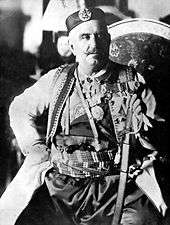
King Nicholas of Montenegro
- King Nicholas of Montenegro called on his subjects to join in a "holy war" against Turkey, as Detchitch fell to the Montenegrins.[16]
- Romania assured Bulgaria of its neutrality.[1]
- The second games of the World Series ended with no winner, with the teams tied 6-6 after 11 innings before darkness forced an early end, meaning that the second game would have to be replayed. The Boston Red Sox had won the first game, 4-3.[17]
October 10, 1912 (Thursday)
- The Rice Institute (now Rice University) was dedicated at Houston.[1]
- The Freewoman feminist weekly newspaper ceased publications in London. [18] It was revived at The New Freewoman the following year and published for another six months.[19]
- A total eclipse of the Sun cast a shadow across South America, and was visible in parts of Ecuador, Colombia, Peru and Brazil.
October 11, 1912 (Friday)
- The Prince of Wales, heir to the British throne and the future King Edward VIII, began his studies at Magdalen College as a commoner.[1]
- Italy and Turkey broke off peace negotiations as Montenegro took Ottoman territory near Skiptchanik (Šipčanik, between Dečić and Tuzi).[1]
October 12, 1912 (Saturday)
- A fire broke out at a mine owned by North Mount Lyell on the west coast of Tasmania, killing 42 miners.[20]
- The largest grain elevator in the world opened at the Port of Montreal, more than doubling the capacity of the port. Over the next five years, the amount of grain shipped through Montreal increased more than 25 times.[21]
- Stock prices dropped in London, Paris, Berlin and Vienna as the First Balkan War escalated.[1]
- The province of Hsikangseng, with a capital at Batang was created from West Szechuan and Eastern Tibet.[1]
- Born: Edward Hidalgo, Mexican-American public servant, 64th United States Secretary of the Navy, highest ranking Hispanic official in the United States Department of Defense, as Eduardo Hidalgo, in Mexico City (d. 1995)
October 13, 1912 (Sunday)
- Bulgaria, Serbia and Greece demanded the Ottoman Empire to grant autonomy to North Macedonia within six months and served an ultimatum on the Turkish government in Istanbul.[22]
October 14, 1912 (Monday)
- Former U.S. President Theodore Roosevelt was shot and wounded by a .38 caliber bullet fired by John Flammang Schrank, a New York City saloonkeeper, who was standing at a distance of only 30 feet. The bullet was slowed when it passed through Roosevelt's metal eyeglasses case and the folded, fifty-page manuscript of Roosevelt's prepared speech,[23] but still penetrated three inches into his chest, too close to the heart to be safely removed by surgery.[24] Schrank was tackled by bystanders before he could fire a second shot, and Roosevelt went on to deliver his speech before getting medical treatment.[25] Schrank would be found insane and would spend the rest of his life at a mental hospital in Waupun, Wisconsin, where he would die on September 15, 1943.
- Montenegro's Prince Danilo led the capture of Tuzi.[1]
- Turkish troops invaded Serbia, crossing at Ristovatz.[1]
- General Benjamín Zeledón died, either killed by his own men or by the victorious Nicaraguan government.[7]
- The first government under Prime Minister Titu Maiorescu was dissolved in Romania.[26]
- The Junior Philatelic Society hosted the Jubilee International Stamp Exhibition in London.[27]
- Born: Joseph Muzquiz, Spanish clergy, promoter of the Opus Dei movement, Badajoz, Spain (d. 1983)
October 15, 1912 (Tuesday)
- Italian and Turkish delegates signed a preliminary peace agreement in Switzerland at Ouchy, with the Italian fleet immediately being recalled from the Aegean Sea and Turkish troops withdrawing three days later from Libya.[28][29]
- Turkey declined to reply to the note from the three Balkan states.[1]
- The New York Giants beat the Boston Red Sox 11-4 to avoid elimination from the World Series and to set up a seventh game.[30]
October 16, 1912 (Wednesday)
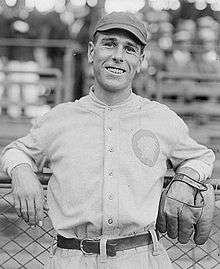
Snodgrass

Merkle
- The Boston Red Sox won the World Series, defeating the New York Giants, 3-2, at Boston. The series had been tied 3-3, and the deciding game was tied 1-1 after nine innings. The Giants had taken a 2-1 lead in the tenth, but then gave up two runs after the Giants' Fred Snodgrass dropped an easy fly ball, Christy Mathewson walked a batter, and Fred Merkle failed to catch a foul ball.[31]
- Bulgarian pilot Radul Minkov and his observer, Prodan Toprakchiev, performed the first reconnaissance and second bombing from an airplane in history, throwing hand grenades from their Albatros F-2 biplane at the railway station of Karaagac near Edirne against Turkey.
- Russian explorer Georgy Brusilov and the 24 crewmen of the Svyataya Anna (St. Anna) became trapped in the Arctic ice after sailing into the Kara Sea.[32] At the time, the ship was still close to Russia's Yamal Peninsula and the crew could have escaped to safety, but Brusilov made the decision to wait out the winter.[33]
- A typhoon in the Philippines killed 1,000 people at Cebu.[1]
- Mexican rebel forces under the command of General Félix Diaz captured Veracruz, Mexico.
- Montenegro captured Berane.[1]
- Born: Maidie Norman, American actress, known for her film roles in The Well and What Ever Happened to Baby Jane?, in Villa Rica, Georgia (d. 1998)
October 17, 1912 (Thursday)
- Krupp engineers Benno Strauss and Eduard Maurer patented austenitic stainless steel.[34]
- Philadelphia Phillies' owner Horace Fogel was expelled from the baseball's National League after having charged in an interview with the Chicago Post that several of the league's umpires, as well as St. Louis Cardinals' manager Roger Bresnahan, had conspired to help the Giants win the 1912 pennant.[35]
- Turkey declared war on Bulgaria and Serbia.[1]
- The French Cycling Federation, governing body for the Tour de France and for bicycling in France, voted to withdraw official approval for women's cycling events.[36]
- Born: Albino Luciani, Italian clergy, pontiff who died 33 days after his selection as Pope John Paul I, in Canale d'Agordo, Italy (d. 1978)
October 18, 1912 (Friday)
- The Ottoman Empire and Italy signed the First Treaty of Lausanne at the Swiss city of Ouchy at 3:30 pm to end the Italo-Turkish War, with the Empire agreeing to grant independence to Tripolitania and Cyrenaica long enough for the North African provinces to come under Italian control.[37] In return for the cession of Libya, as well as the Dodecanese Islands, Italy paid a sum representing 4 percent of the Ottoman national debt (in consideration of the cost of the war) and allowed the Ottoman Sultan to continue as the Caliph of Libyan Muslims.[38] The Ottoman field commanders were ordered to withdraw their men, despite their feeling that they "were more than sure of their ability to win the war", and transferred Libyan soldiers to Istanbul for military training and an eventual recapture of the territory, a plan which would fail during the World War I.[29]
- King Ferdinand of Bulgaria issued a proclamation of holy war against the Ottoman Empire.[1]
October 19, 1912 (Saturday)
- The infantries of the Balkan League (Montenegro, Serbia, Greece and Bulgaria) crossed their borders into the western Ottoman Empire.[39]
- The Turkish warship Torgul Reis bombarded the Bulgarian ports of Varna and Balchik on the Black Sea.[40]
October 20, 1912 (Sunday)
- William Kolehmainen, a brother of Olympic distance runner Hannes Kolehmainen who had abandoned his amateur status, set a world record in the marathon as a professional athlete, running the 26 mile, 385 yard distance in 2 hours, 29 minutes, and 39.2 seconds for the fastest marathon up to that time. The previous mark of 2:32:21 had been held by Hans Holmer. The official (amateur) record at the time was 2:40:32.2, held by Thure Johansson of Sweden.[41]
- Turkey's Vardar Army engaged in its first major battles against the Balkan League invaders. The Serbian Timok Infantry overcame the Turks at Egri Palanga, and the Bulgarian Second Infantry forced a retreat of the Ottoman 16th Infantry at Kocana, North Macedonia. At Bilac, the Ottoman 19th Infantry was able to resist the invading Serbian Morava Infantry.[39]
- Great Britain recognized Italian sovereignty over Tripoli and Cyrenaica.[1]
October 21, 1912 (Monday)
- Greece took control of Thessaly and Lemnos in North Macedonia while Bulgaria captured Fort Chermen, and Serbia took the mountain Sultan Tepe.[42]
- Born: Georg Solti, Hungarian-British conductor, musical director of the Chicago Symphony Orchestra, as György Stern in Budapest (d. 1997)
October 22, 1912 (Tuesday)
- The Prince Alexei of Russia was reported to be seriously ill from haemophilia.[1]
- The Serbian Third Army captured Pristina from the Ottomans, celebrating a return to the city that had been taken by the Turks in 1389.[43]
- Born:
- Johan Hendrik Weidner, Belgian-Dutch partisan, member of the Dutch resistance during World War II, recipient of the Order of Orange-Nassau, Croix de Guerre, and Legion of Honour, in Brussels (d. 1994)
- Frances Drake actress, known for film roles including Les Misérables, in New York City (d. 2000)
October 23, 1912 (Wednesday)
- The Kaiser Wilhelm Institute for Chemistry (now the Max Planck Institute for Chemistry), and the Kaiser Wilhelm Institute for Physical Chemistry and Electrochemistry (now the Fritz Haber Institute), were both formally inaugurated in the Berlin suburb of Dahlem as the first two research institutions for the Kaiser Wilhelm Society for the Advancement of Science.[44]
- Danish Prime Minister Klaus Berntsen introduced a constitutional reform bill to provide for women's suffrage in Denmark.[1]
- General Félix Diaz was taken prisoner as Mexican government troops retook Veracruz, Mexico.[1]
- As the First Balkan War continued, the Battle of Kumanovo began between the Serbian and Ottoman armies.[1]
October 24, 1912 (Thursday)
- Kirk-Kilisse fell to Bulgaria, and Kumanovo fell to Serbia in North Macedonia.[1]
- Harry Hawker, founder of Hawker Aircraft set a record of being airborne for 8 hours and 23 minutes at Brooklands, England.[1]
- New York City Police Department lieutenant Charles Becker was found guilty of the killing of gambler Herman Rosenthal.[1]
- Died:
- Mykola Lysenko, 70, Ukrainian composer, known for operas Natalka Poltavka and Taras Bulba (b. 1842)
- Arthur Peel, 83, Speaker of the House of Commons from 1884 to 1895 (b. 1829)
October 25, 1912 (Friday)
- Bulgarian troops advanced on Adrianople, while the Greek Army occupied Kozani in Western Macedonia.[1]
- France and Spain agreed on the division of Morocco.[1]
- The Richard Strauss opera Ariadne auf Naxos opened in Stuttgart.[1]
- High school friends and aspiring writers Tristan Tzara and Ion Vinea, with artist Marcel Janco, began publishing the literary magazine Symbol to promote the Symbolist movement in Romania. Despite their ambitious goals, the magazine folded in December.[45]
- Born: Minnie Pearl, American comedian and singer, best known for her Ozark character in country television variety series Hee Haw, in Centerville, Tennessee (d. 1996)
October 26, 1912 (Saturday)
- Greek forces took control of the city of Selanik from the Ottoman Empire, restoring Thessaloniki to Greek control. The Ottoman Empire had captured the city on March 29, 1430.[46]
- U.S. President William Howard Taft appeared at the dedication of Alliance College, founded by the Polish National Alliance in Cambridge Springs, Pennsylvania.[47] The college would cease operations on June 30, 1987.[48]
- General Félix Díaz was sentenced to death by court-martial.[1]
- The Serbian army captured Skopje (called Uskub by the Ottomans) from the Ottoman Empire.[49]
- Romanian Prime Minister Titu Maiorescu reconstituted his cabinet.[1]
- Born: Don Siegel, American film director, best known for films Invasion of the Body Snatchers, Dirty Harry, The Shootist, and Escape from Alcatraz, in Chicago (d. 1991)
October 27, 1912 (Sunday)
- Bulgaria occupied Ishtip, North Macedonia.[1]
October 28, 1912 (Monday)
- Twelve days after becoming trapped in an ice field during the disastrous Brusilov expedition, the crew of the Svyataya Anna lost their chance to escape to safety when winds sent the field drifting northward into the Arctic Ocean, with the ship locked inside. The ship would remain trapped in moving ice for a year and a half, and only two of the sailors would survive.[32] The ship's log would finally be found in July 2010.[50]
- The Serbian Army occupied Köprülü, now known as Veles, North Macedonia.[1]
- The Bulgarian Army occupied Drama and Babi Eski, Macedonia. The latter cut the Ottoman line communications with Constantinople.[1]
- The Montenegran and Serbian Army met at Sjenica (now part of Serbia).[1]
- Six people died when the Irish collier Tenet sank in the Bristol Channel.[1]
- Born: Richard Doll, English medical researcher, best known for linking certain health effects to smoking, in Hampton, London, England (d. 2005)
October 29, 1912 (Tuesday)
- Ahmed Muhtar Pasha resigned as Grand Vizier of Turkey, and was succeeded by Kâmil Pasha.[1]
- Greek Army forces occupied Veria, Central Macedonia.[1]
- The Ottoman Army under Nazım Pasha and Bulgarian Army forces began the Battle of Lule Burgas in Thrace.[1]
- Serbia began civil authority in areas they controlled in Macedonia.[1]
October 30, 1912 (Wednesday)

Vice-President James S. Sherman
- James S. Sherman, Vice President of the United States, died in office, six days before the presidential election. Sherman, 57 years old, died at 9:42 pm at his home in Utica, New York from acute kidney failure. His physician, Dr. Fayette H. Peck, said that Sherman's decline had been caused by the strain of his acceptance speech on August 24, when the Republican National Convention had re-nominated him as President William Howard Taft's running mate.[51]
- Bulgarian Army forces captured Lule Burgas in Thrace.[1]
- The U.S. Navy battleship USS New York was launched in Brooklyn, New York City.[1]
- Born: José Ferrater Mora, Spanish philosopher, noted for promoting extending universal rights to humans and animals as both are part of the same moral sphere, in Barcelona (d. 1991)
- Died: Alejandro Gorostiaga, Chilean army officer, noted commander during the War of the Pacific (b. 1840)
October 31, 1912 (Thursday)
- Nazım Pasha and the Ottoman Army were driven from Thrace by the Bulgarian Army who captured Tchorlu. The Ottomans retreated to their line of defense at Chatalja.[1]
- The Serbian Army occupied Prisend in what is now Kosovo.[1]
- The Greek Army occupied Grevena, Western Macedonia and the islands Imbros and Thasos.[1]
- The Montenegrin Army occupied Ipek in what is now Kosovo.[1]
- The French government proposed that powers should proclaim disinterest, and offered to mediate between the Ottoman Empire and the Balkan League.[1]
- Born Ollie Johnston, American animator, member of Disney's Nine Old Men, known for the Walt Disney films Snow White and the Seven Dwarfs, Fantasia and Bambi, in Palo Alto, California (d. 2008)
gollark: ^help
gollark: ^help gib
gollark: !nas
gollark: ^gib Code
gollark: ^gib Gaming
References
- The Britannica Year-Book 1913: A Survey of the World's Progress Since the Completion in 1910 of the Encyclopædia Britannica] (Encyclopædia Britannica, 1913) pp. xxxvii-xxxix
- "Servian Demand Rejected", New York Times, October 2, 1912; "Ottoman Army to Be Mobilized", New York Times, October 3, 1912
- DeWitt C. Ellinwood, Between Two Worlds: A Rajput Officer in the Indian Army, 1905-21 : Based on the Diary of Amar Singh of Jaipur (University Press of America, 2005) p. 188
- Erik J. Zürcher, Turkey: A Modern History (I.B.Tauris, Oct 15, 2004) p. 106
- Daniel Eagan, America's Film Legacy: The Authoritative Guide to the Landmark Movies in the National Film Registry (Continuum International, 2009)
- Freek L. Bakker, The Challenge of the Silver Screen: An Analysis of the Cinematic Portraits of Jesus, Rama, Buddha and Muhammad (BRILL, 2009) p. 16
- Max Boot, The Savage Wars Of Peace: Small Wars And The Rise Of American Power (Basic Books, 2003) p. 248
- Lee Bennett Hopkins, Days to Celebrate: A Full Year of Poetry, People, Holidays, History, Fascinating Facts, and More (HarperCollins, 2004) p. 87
- "Submarine Is Sunk by Liner; 15 Lost", New York Times, October 5, 1912, p. 4
- Daniel Marston and Carter Malkasian , Counterinsurgency in Modern Warfare (Osprey Publishing, 2008) pp. 67-68; "Nicaraguan Rebel Defeat", New York Times, October 5, 1912
- Donald B. Smith, Calgary's Grand Story: The Making of a Prairie Metropolis from the Viewpoint of Two Heritage Buildings (University of Calgary Press, 2005) pp. 110-113
- Nick Tosches, King of the Jews (HarperCollins, 2005)
- Gregory W. Frazier, Motorcycle Adventurer: Carl Stearns Clancy: First Motorcyclist to Ride Around the World 1912-1913 (iUniverse, 2010) p. xiv
- Carl Cavanagh Hodge, Encyclopedia of the Age of Imperialism, 1800-1914 (Greenwood Publishing Group, 2008) pp. 69-70
- U.S. National Library of Medicine
- "Proclamation by Nicholas" , New York Times, October 10, 1912
- "11-Inning Tie, 6-6, in Hard-fought Game in Boston" , New York Times, October 10, 1912
- "The Freewoman: A Weekly Feminist Review". The Modernist Journals Project. Retrieved 5 October 2015.
- "The New Freewoman: An Individualist Review". Brown University. Retrieved 12 January 2016.
- The Peaks of Lyell Fourth Edition, start of chapter 22 The Disaster p. 214
- Rennay Craats, Canada Through the Decades: The 1910s (Weigl Educational Publishers Limited, 2000) p. 27
- The Balkan Wars: 1912-13: The War Correspondence of Leon Trotsky (Pathfinder Press, 1980) pp. 453-454
- Willard M. Oliver and Nancy E. Marion, Killing the President: Assassinations, Attempts, and Rumored Attempts on U.S. Commanders-In-Chief (ABC-CLIO, 2010) pp. 80-85
- "The Little Round That Refuses to Die", by David J. LaPell, Gun Digest 2011, p. 118
- "Insane Man Shoots Roosevelt", Milwaukee Sentinel, October 15, 1912, p. 1
- Stelian Neagoe - "Istoria guvernelor României de la începuturi - 1859 până în zilele noastre - 1995" (Ed. Machiavelli, Bucharest, 1995)
- "The Jubilee International Stamp Exhibition" by Charles J. Phillips in Stanley Gibbons Monthly Journal, 31 October 2012, pp. 290-297.
- "Turkish-Italian Peace Arranged" , New York Times, October 16, 1912
- Mesut Uyar and Edward J. Erickson, A Military History of the Ottomans: From Osman to Atatürk (ABC-CLIO, 2009) p. 225
- "Giants Win, 11-4; Bostonians Fear Loss of Series" , New York Times, October 16, 1912
- "Sox Champions on Muffed Fly" , New York Times, October 17, 1912; Timothy M. Gay, Tris Speaker: The Rough-and-Tumble Life of a Baseball Legend (University of Nebraska Press, 2005) pp. 20-21
- Nataliya Marchenko, Russian Arctic Seas: Navigational Conditions and Accidents (Springer, 2012) p. 61
- Valerian Ivanovich Alʹbanov, In the Land of White Death: An Epic Story of Survival in the Siberian Arctic (Random House Digital, 2000, with introduction by David Roberts)
- "ThyssenKrupp Nirosta: History". Archived from the original on 2 September 2007. Retrieved August 13, 2007.
- Daniel E. Ginsburg, The Fix Is In: A History of Baseball Gambling and Game Fixing Scandals (McFarland, 2004) p. 81
- Christopher S. Thompson, The Tour de France: A Cultural History (University of California Press, 2006) p. 130
- "Treaty with Italy Signed" , New York Times, October 19, 1912
- Mark I. Choate, Emigrant Nation: The Making of Italy Abroad (Harvard University Press, 2008) p. 176
- Edward J. Erickson, Defeat in Detail: The Ottoman Army in the Balkans, 1912-1913 (Greenwood Publishing Group, 2003) p. 169
- Randal Gray, Conway's All the World's Fighting Ships, 1906-1921 (Volume 2) (Naval Institute Press, 1985) p. 390
- "Marathon Record for Kolehmainen", New York Times, October 21, 1912; David E. Martin and Roger W. H. Gynn, The Olympic Marathon (Human Kinetics, 2000) p. 65
- Deniz Bölükbaşı, Turkey And Greece: The Aegean Disputes (Routledge, 2004) p. 26
- Nancy M. Wingfield and Maria Bucur, Gender and War in Twentieth-Century Eastern Europe (Indiana University Press, 2006) p. 165
- Klaus Hoffmann, Otto Hahn: Achievement and Responsibility (Springer, 2001) p. 67
- Tom Sandqvist, Dada East. The Romanians of Cabaret Voltaire, MIT Press, Cambridge, Massachusetts & London, 2006. ISBN 0-262-19507-0, pp. 72-73
- Dimitar Bechev, Historical Dictionary of the Republic of Macedonia (Scarecrow Press, 2009) p. 23
- Hans P. Vought, The Bully Pulpit And The Melting Pot: American Presidents And The Immigrant, 1897-1933 (Mercer University Press, 2004) p. 89
- "Polite Avoidance: The Story Behind the Closing of Alliance College", by Michael T. Urbanski, Polish American Studies (Spring 2009)
- "Allies Capture Uskub, Close in on Adrianople", New York Times, October 27, 1912
- "Russia finds last-days log of famed 1912 Arctic expedition", Agence France-Presse], September 13, 2010
- "Sherman Is Dead, Hurt by Speech", New York Times, October 31, 1912, p. 1
This article is issued from Wikipedia. The text is licensed under Creative Commons - Attribution - Sharealike. Additional terms may apply for the media files.